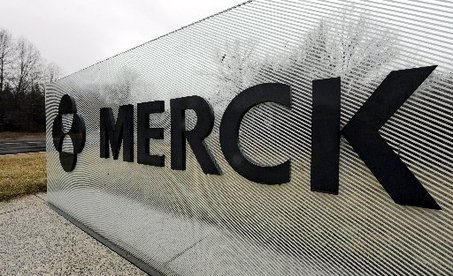
MAJOR cost cuts has enabled drugmaker Merck & Co to offset lower first-quarter sales as generic competition continues to hurt sales of former blockbuster medicines. Merck’s profit rose seven per cent, trouncing Wall Street expectations.
Merck on Tuesday said it plans to rely on its pipeline of experimental drugs for future sales. That would make it an exception to the trend among many other drugmakers, which are pursuing big acquisitions to keep sales growing.
The maker of the diabetes pill Januvia said net income was $US1.71 billion ($A1.85 billion), or 57 US cents per share, up from $US1.59 billion, or 52 US cents per share, a year earlier.
Excluding $US896 million in restructuring and acquisition charges, net income was $US2.6 billion, or 88 US cents per share – nine US cents better than analysts expected.
Revenue totalled $US10.26 billion, down four per cent and just below the $US10.44 billion analysts expected.
Pharmaceutical sales dropped five per cent, to $US8.45 billion, as cheaper generic copycat pills hammered several off-patent drugs that once brought in billions each year: asthma and allergy pill Singulair, allergy spray Nasonex and blood pressure drugs Cozaar and Hyzaar.
Merck’s top sellers, Type 2 diabetes pills Januvia and Janumet, brought in a combined $US1.33 billion, up three per cent. Sales jumped 10 per cent to $US604 million for immune disorder drug Remicade, and also rose for HIV drug Isentress and several other products.
Lower sales of nonprescription Claritin allergy pills dragged down consumer health sales four per cent to $US454 million. Sales of veterinary medicines declined three per cent to $US813 million.
Analysts were surprised by the level of cost cuts: eight per cent for administration and marketing expenses and 17 per cent for research spending as new research head Roger Perlmutter continues to cut Merck’s least-promising programs. Merck, based in Whitehouse Station, New Jersey, reduced its global workforce by 2,000 in the quarter, to 74,000.
“It is a necessary but not sufficient part of their execution strategy,” Edward Jones analyst Judson Clark said of the cuts. He said Merck can’t keep cutting that much without risk of hurting future growth, and must get key drugs in its pipeline approved to do well.
CEO Kenneth Frazier told analysts during a conference call that Merck had promising experimental drugs in testing for hepatitis C, HIV and various cancers.
“We’re excited by our pipeline and what’s to come,” he said.
Meanwhile, Merck’s two tablets for gradually reducing seasonal allergies to grass and ragweed were recently approved. Because patients must start the daily immunotherapy tablets a few months before allergy season begins, Merck said it’s now promoting Ragwitek to doctors but it’s too late to promote Grasstek this year.
With the recent spurt of proposed acquisitions and asset swaps in the pharmaceutical industry, analysts asked if Merck would do such a deal. Frazier said small deals might be possible, but he’s focused on growth through new drugs for unmet medical needs.
“Our preferred (growth) route is through innovation rather than consolidation,” he said.
Merck re-affirmed its 2014 forecast for profit of $US2.15 to $US2.47 per share, prompting analysts to ask why it didn’t raise its forecast. Merck said that’s because Venezuela may devalue its currency, which would decrease the value of sales there.
“Anytime you see a nine-cent beat, you’d like to see guidance walk up,” so Merck may expect a slightly softer second quarter, Clark said.
Source: Courier Mail
